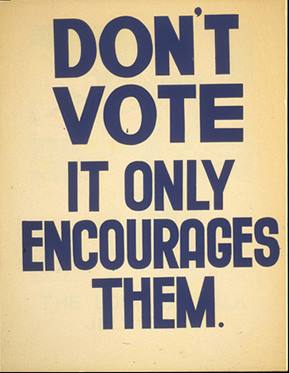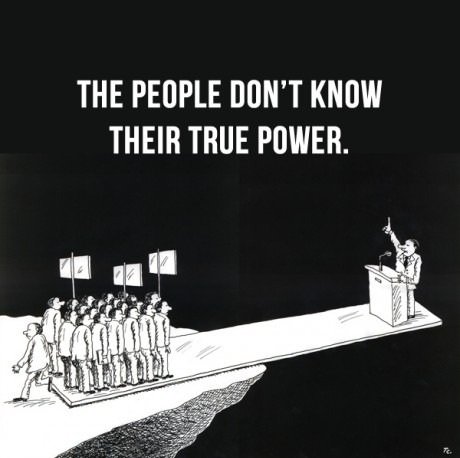Voting as an act of self-defence: utterly futile (at best)

In his classic No Treason: The Constitution of No Authority, nineteenth century individualist anarchist Lysander Spooner argues forcefully against the legitimate authority of the American constitution (and by extension to any political constitution). He points out that voting cannot be seen as a transmission of actual consent:
In truth, in the case of individuals, their actual voting is not to be taken as proof of consent, even for the time being. On the contrary, it is to be considered that, without his consent having even been asked a man finds himself environed by a government that he cannot resist; a government that forces him to pay money, render service, and forego the exercise of many of his natural rights, under peril of weighty punishments.
About this he is absolutely right. He goes on:
He sees, too, that other men practice this tyranny over him by the use of the ballot. He sees further, that, if he will but use the ballot himself, he has some chance of relieving himself from this tyranny of others, by subjecting them to his own. In short, he finds himself, without his consent, so situated that, if he use the ballot, he may become a master; if he does not use it, he must become a slave. And he has no other alternative than these two. In self- defence, he attempts the former.
But can the act of voting plausibly be regarded as an act of self-defence?
I think not. The probability that a single vote will have an effect on the outcome of a political election is so extraordinarily small that it for all practical purposes can be equated with zero. If voting would be an act of self-defence it would be an utterly futile one. It could perhaps be compared to "defending yourself" against an impending tank by throwing a grain of sand at it. A totally pointless act at best.
Spooner offers an analogy of his own:
His [the individual voter's] case is analogous to that of a man who has been forced into battle, where he must either kill others, or be killed himself. Because, to save his own life in battle, a man takes the lives of his opponents, it is not to be inferred that the battle is one of his own choosing.
But this analogy is misleading. Even though it is correct that in battle you may have to kill others in order to save your own life, such acts of self-defence have a more or less direct impact on the outcome. If you manage to kill your enemy you will survive for the time being, if not you will die and your enemy will survive for the time being. In voting, by contrast, the chance of having any impact on the outcome is absolutely minuscule.
It could be argued that, as long as there is some chance, however tiny, why not do it? But given how utterly hopeless the strategy is, a more relevant question is why do it? In other words, given the probabilities involved, the burden of proof falls on those who recommend voting as an act of self-defence, not on those who recommend not doing it. "I did it in self-defence" is a very reasonable response to the question "why did you kill that soldier who was just about to kill you?", but not to the question "why did you throw a grain of sand on that tank that was about to run you over?". It could be argued that doing a pointless act is harmless and deserves no criticism. But even if that is true (to the extent that it is), isn't there something deeply problematic with radically overestimating your chances of success and letting your actions be guided by false beliefs?
An even better analogy than throwing a grain of sand at an impending tank, however, is cheering on another tank that is coming at you from another direction. This other tank may be able to stop the first one from running you over before itself running you over. (And your cheering will of course not impact the outcome one way or the other.) I think it is misleading to say, like Spooner, that if the voter uses the ballot "he may become a master; if he does not use it, he must become a slave" because using the ballot will never make you a master! Voting is better described as cheering on one master under which you will become a slave or cheering on another master under which you will become a slave.

Is there really nothing else one can do?
Spooner speaks of voting as an individual's "only chance of self- preservation". He says that the individual "has no other alternative than these two"; that is, either passively succumbing to slavery or actively going for a slight (practically non-existent) chance of becoming a master. It is true that you will become a slave regardless of whether you vote or not, but I do not think it is correct to say that there is nothing else you can do. It is mistaken to describe the situation as one in which there is "no other means of self-defence offered" and that the options are such that the voter "as matter of necessity, used the only one that was left to him." In fact, there are plenty of other things that you can do in order to defend yourself against the state that are more accurately described as acts of self-defence. This includes (but is not limited to) evading taxes and ignoring unjust laws whenever you can get away with it.
Even the active choice of abstaining from voting can itself be seen as, if not an act of self-preservation, then at least one of protest. Like Wendy McElroy says:
Those who refuse to vote are not expressing silence. They are screaming in the politician's ear: "You do not represent me. This is not a process in which my voice matters. I do not believe you."
In fact, turning your back on politics can be a much more powerful protest against the system than voting.

Congratulations! This post has been upvoted from the communal account, @minnowsupport, by Pomperipossa from the Minnow Support Project. It's a witness project run by aggroed, ausbitbank, teamsteem, theprophet0, and someguy123. The goal is to help Steemit grow by supporting Minnows and creating a social network. Please find us in the Peace, Abundance, and Liberty Network (PALnet) Discord Channel. It's a completely public and open space to all members of the Steemit community who voluntarily choose to be there.
If you like what we're doing please upvote this comment so we can continue to build the community account that's supporting all members.
I can't see any holes in your critic of Lysander Spooner. Upvoted and resteemed.
Thanks! I have recently seen voting being condoned as self-defence with reference to Spooner, but it is a problematic aspect of his otherwise brilliant and still relevant text.
I agree with you on the fact that non-voting is a powerful protest against the political system. But I believe that it's not the protest that will save us from the political system in which we find ourselves.
As Terence McKenna said:
So instead of confronting this bad system in place, we must come up with another system that is better suited to fulfill the needs of the people. Or so I believe.
Thanks for the high quality post. Upvoted and Followed :)
Thanks! I think we need to do both; criticise the political system and the ideas behind it, and also to come up with alternative systems.